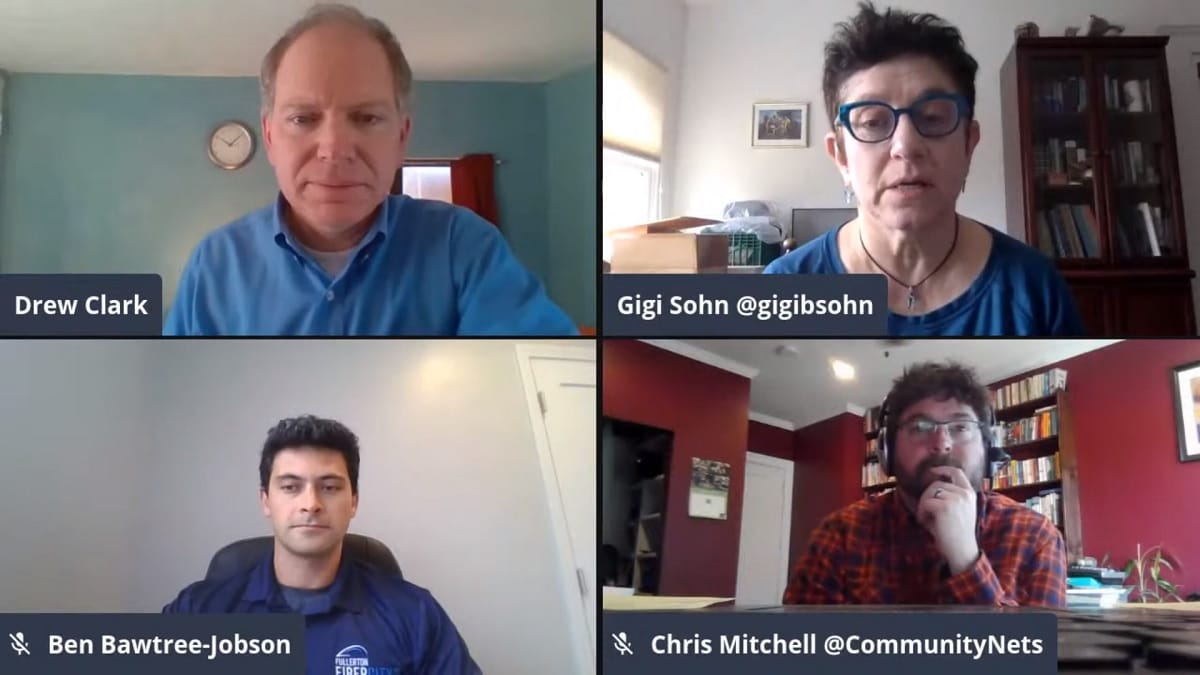The FCC Could Do More Now About the Digital Divide, Say Panelists at Broadband Breakfast Live Online Event
April 2, 2020 – “It’s really unfortunate that it has taken a national emergency, a worldwide pandemic, for people to realize how many people don’t have access to broadband internet,” said Georgetown Law Distinguished Fellow Gigi Sohn on a Broadband Breakfast Live Online event Tuesday. When she testi
Adrienne Patton

April 2, 2020 – “It’s really unfortunate that it has taken a national emergency, a worldwide pandemic, for people to realize how many people don’t have access to broadband internet,” said Georgetown Law Distinguished Fellow Gigi Sohn on a Broadband Breakfast Live Online event Tuesday.
When she testified before Congress about two months ago, Sohn shared census data that 141 million Americans do not have access, recalled Sohn.
Broadband is not only about connection; it’s about safety, said Sohn, who is also senior fellow at the Benton Institute for Broadband and Society.
Sohn admitted that she is a “skeptic” of data caps, but urged mobile and fixed internet service providers to remove data caps immediately.
Right now, the Federal Communications Commission could make E-Rate funds available for mobile hotspots and connectivity. “This is the classroom today,” said Sohn, arguing that those funds apply and are necessary.
The money in the Universal Service Fund is shrinking because it is only funded by telephone services, which have become nearly obsolete and not “sustainable,” said Sohn.
“Let’s be honest folks; this FCC and their friends in Congress hate E-rate, and they hate Lifeline because they are subsidy programs that help poor people and brown and black people,” said Sohn passionately.
Chris Mitchell, director of the Community Broadband Networks Initiative at the Institute for Local Self Reliance, highlighted the dissonance between government urging Americans to stay home but making broadband accessible outside of the home, like school parking lots.
Mitchell said a significant flaw with the Rural Digital Opportunity Fund is the allocation of billions of dollars to service areas with 25/3 megabits per second, a speed that will soon be outdated.
“This is a really bad decision,” argued Mitchell. “We’re going to pay for these networks twice,” complained Mitchell.
SiFi Networks CEO Ben Bawtree-Jobson’s private company works with cities to streamline and efficiently construct networks.
SiFi Networks works to build universally across cities because it doesn’t want to create a digital divide, said Bawtree-Jobson. Also, SiFi Networks has a long-term development vision, thinking about how connectivity can improve and progress areas.
Sohn said communities want everyone to be connected because it improves their economy, and open access could be the “antidote.”
Mitchell said the country should not wait until after the coronavirus pandemic to focus on broadband; it has to be a priority now.
Beginning on Wednesday, April 8, 2020, Broadband Breakfast Live Online will hold live events every Wednesday at 12 Noon ET.
Guests for this event:
- Ben Bawtree-Jobson, CEO, SiFi Networks
- Chris Mitchell, Director of the Community Broadband Networks Initiative, Institute for Local Self Reliance
- Gigi Sohn, Distinguished Fellow, Georgetown Law Institute for Technology Law & Policy ; Senior Fellow and Public Advocate, Benton Institute for Broadband and Society
- Drew Clark (Moderator), Editor and Publisher, Broadband Breakfast
Panelist Resources:
- https://muninetworks.org/
- https://muninetworks.org/broadbandbits
- https://www.benton.org/blog/digital-equity-and-broadband-adoption
- https://www.benton.org/blog/state-broadband-2020
- https://broadbandbreakfast.com/2019/04/sifi-networks-announces-whole-city-open-access-fiber-network-in-fullerton-california/
- https://broadbandbreakfast.com/2019/04/sifi-networks-brings-infrastructure-financing-to-california-with-75-million-open-access-fiber-in-fullerton/
Follow upcoming Live Online events, see Broadband Breakfast Live Online Will Stream Daily in March on ‘Broadband and the Coronavirus’









Member discussion